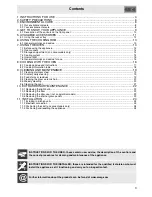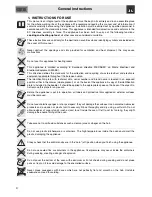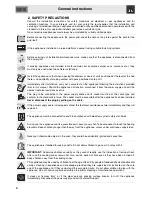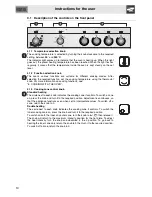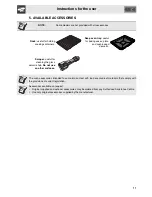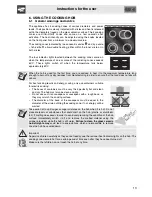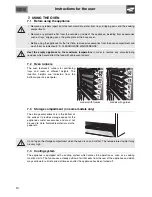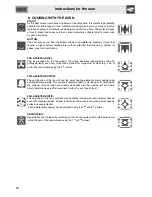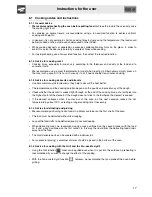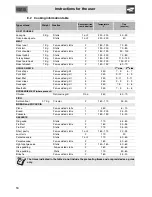
General instructions
4
1. INSTRUCTIONS FOR USE
This manual is an integral part of the appliance. It must be kept in its entirety and in an accessible place
for the whole working life of the appliance. We recommend reading this manual and all information it
contains carefully before using the appliance. Installation must be carried out by qualified personnel in
accordance with the standards in force. This appliance is intended for domestic use and conforms to the
EC directives currently in force. The appliance has been built to carry out the following functions:
cooking and heating up food
; all other uses are considered unsuitable.
These instructions are valid only for the destination countries whose identifying symbols are included on
the cover of this manual.
Never obstruct the openings and slots provided for ventilation and heat dispersal; this may cause
malfunctions.
Do not use this appliance for heating rooms.
This appliance is marked according to European directive 2002/96/EC on Waste Electrical and
Electronic Equipment (WEEE).
This directive defines the standards for the collection and recycling of waste electrical and electronic
equipment applicable throughout the European union.
The identification plate with technical data, serial number and brand name is located in an exposed
position either in the drawer (where present) or on the back of the appliance. A copy of the identification
plate is included in the booklet. It should be applied to the appropriate space on the back of the cover. Do
not remove this plate for any reason.
Before the appliance is put into operation, all labels and protective films applied on external surfaces
must be removed.
Do not use metallic sponges or sharp scrapers: they will damage the surfaces. Use normal non-abrasive
products and a wooden or plastic tool if necessary. Rinse thoroughly and dry using a soft cloth. Do not
allow residues of sugary foods (such as jam) to set inside the oven. If left to set for too long, they might
damage the enamel lining of the oven.
Take care not to spill acid substances such as lemon juice or vinegar on the hob.
Do not use plastic kitchenware or containers. The high temperatures inside the oven could melt the
plastic, damaging the appliance.
Always check that the control knobs are in the “zero” (off) position when you finish using the appliance.
Do not use sealed tins or containers in the appliance. Overpressure may occur inside the containers
during cooking, creating a danger of explosion.
Do not cover the bottom of the oven with aluminium or tin foil sheets during cooking and do not place
pans or trays on it to avoid damage to the enamelled surface.
Never place saucepans with bases which are not perfectly flat and smooth on the hob. Unstable
cookware can lead to scalding.

